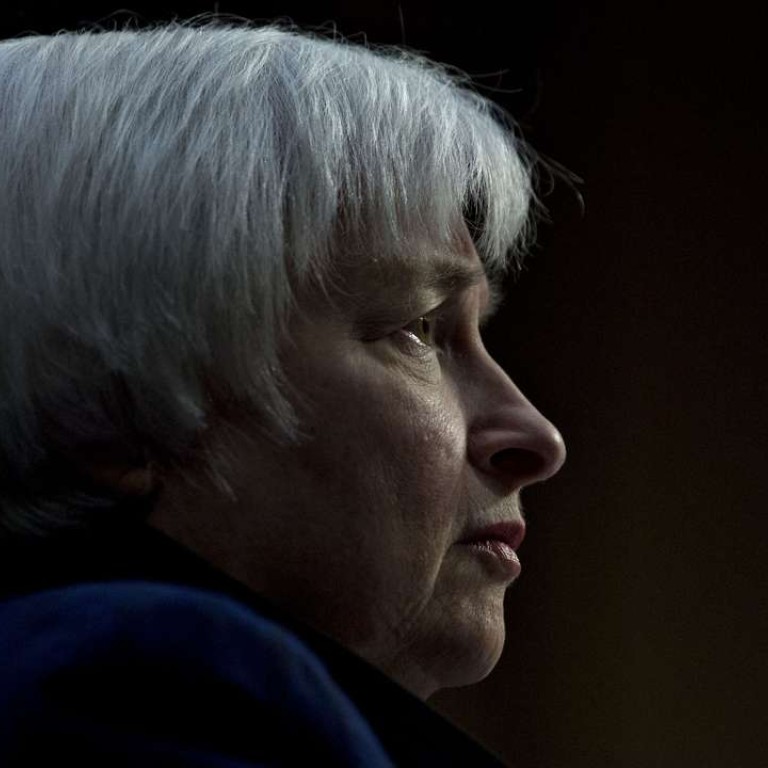
Fed chief Yellen: Trump’s spending plan to stoke inflation, jack up US debt
Federal Reserve Chair Janet Yellen warned Congress Thursday that a big government spending plan -- similar to what President-elect Donald Trump is proposing -- would fuel inflation and swell the national debt.
Yellen also said Trump’s victory has not altered Fed plans to raise interest rates next month, though his economic policies eventually could force the central bank to reassess its outlook.
“The economy is operating relatively close to full employment at this point,” Yellen told the Joint Economic Committee. As a result, massive government outlays would drive up inflation as employers bid up wages to attract a limited pool of workers.
By contrast, she said, the economy needed a jolt to anaemic demand after the 2008 financial crisis.
Yellen added. “The long-run deficit probably needs to be kept in mind.” The national debt, she noted, is about 77 per cent of gross domestic product, adding, “There’s not a lot of fiscal space should a shock to the economy occur.”
Yellen said she was not passing judgment on Trump’s plan to spend US$550 billion to upgrade the nation’s crumbling infrastructure, boost defence spending and cut taxes sharply. That, she said, is Congress’s role. In the past, Yellen has urged Congress to pass fiscal stimulus to take the burden of goosing a sluggish economy off the Fed alone.
Her remarks Wednesday, however, reflect a new landscape now that the unemployment rate is at a near-normal 4.9 per cent, down from 10 per cent in 2009.
Barclays Chief US economist Michael Gapen says Trump’s proposals would likely lengthen the recovery, but spur faster inflation and deficit concerns that threaten growth in a few years.
Yellen said the Fed remains on track to lift its benchmark rate in December for the first time this year despite Trump’s election.
“To my mind, the evidence we’ve seen since (the Fed’s early November meeting) reinforces our judgment” that the federal funds rate should go up soon. “When there is greater clarity about” Trump’s economic policies, the Fed will “perhaps adjust our outlook.”
After Trump’s win, some economists suggested the Fed would delay a rate increase, contending the Republican’s trade and immigration policies would slow growth. But many others have said his ambitious plans to upgrade roads, bridges and waterways likely would stoke the economy and inflation in the near-term, requiring faster rate hikes. Trump’s proposed massive tax cuts also could widen the deficit and fuel inflation and higher rates.
In her prepared testimony, however, Yellen said policymakers continue to expect the pace of growth “will warrant only gradual increases” in its key rate, noting the economy is still set to expand slowly by historical standards. She cited low productivity growth, saying Congress should consider policies to bolster “long-run growth and productivity.”
That suggests that policies that improve workers skills, for example, are more critical to the economy’s long-term health than short-term stimulus measures.
Meanwhile, Yellen said putting off a rate increase could lead to more abrupt hikes down the road.
“Were (the Fed) to delay increases in the federal funds rate for too long it could end up having to tighten policy relatively abruptly to keep the economy from significantly overshooting” the Fed’s unemployment and inflation targets Yellen said.
Delays “also could encourage excessive risk-taking and ultimately undermine financial stability.” The Fed has held its federal funds rate steady since raising it in December for the first time in nine years.

When the Fed held rates steady in September, Yellen said discouraged workers on the sidelines were being drawn into an improving labour market, keeping the unemployment rate from falling and tempering wage growth and inflation. She said the Fed wanted to encourage that trend by holding off on a rate increase a bit longer.
In her testimony, Yellen said she opposes proposals that would lift the Dodd-Frank financial reform’s constraints on large banks. She said that would reignite risks that led to the financial crisis, though she supports easing the law’s burdens on community banks. Trump has called for repealing the legislation.
“I wouldn’t want to see the clock turned back,” Yellen said.
In September, Trump contended Yellen was keeping interest rates low to help President Barack Obama, stoking a stock market bubble. Yellen simply responded that the Fed steers clear of politics.
Some Fed watchers have speculated that Yellen may resign after Trump takes office, but she said Wednesday she plans to complete her term as chair, which ends in February 2018.

